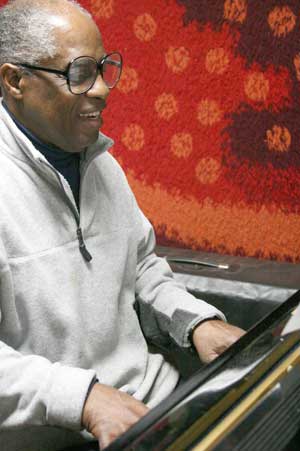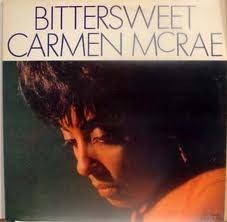If You Could Love Me – Norman Simmons
This Latin lament is a true baring of the soul: its deeply honest lyric and emotive melody make for a powerful composition. Carmen McRae vocal transcription available.
- Recording: Carmen McRae - Bittersweet
- Recorded on: May 20, 1964
- Label: Focus (SD 334)
- Concert Key: F minor
- Vocal Range: Contralto, D-sharp3 to G4 written 8va
- Style: Ballad
- Vocal - Carmen McRae
- Guitar - Mundell Lowe
Video
- Description
- Historical Notes
- Solos
- Piano Corner
- Bass Corner
- Drum Corner
- Guitar Corner
- Inside & Beyond
- Minus You
It's interesting to compare the different tempos vocalists choose. To date (2011) we've found four vocal recordings of this composition. They're all in the Latin vein, including Carmen McRae's introduction of the song in 1964. Carmen performs it as a slow Latin, at a ballad-like tempo (approximately quarter note = 64 bpm). The next recording we've found is by Judy Wexler, at a little faster tempo (ca. 90). Carol Sloane sang it a bit faster (ca. 104), and last is the fastest version, a medium Latin tempo, by Melissa Walker (ca. 118)
Norman can also hear it without the Latin influence, as a rubato ballad, or as a slow ballad with time.
Lyric Description: This lyric is a direct and heartfelt plea for love, offering everything in return, but requiring action of the beloved.
If another key would be better for you, send the key you'd like to Don and we'll post the transposition on the website for purchase. If you're not sure which key is best, send us your range and we'll work with you to figure out the best key.
Carmen McRae version
Carol Sloane version
Melissa Walker version
Related Songs
Email Send If You Could Love Me to a friend

Norman Simmons
October 6, 1929 – May 13, 2021
Accomplished soloist, accompanist, composer and educator, Norman Simmons is well known as a pianist with an great ability to connect with jazz singers. Born in Chicago, Simmons taught himself piano and at age sixteen enrolled in the Chicago School of Music. He formed his own group in 1949 and began recording in 1952 when he worked as a house pianist for Chicago clubs The BeeHive and the C&C Lounge. During this period, his first recordings were under the leadership of tenor saxophonists Claude McLin, Paul Bascomb and Coleman Hawkins. Read more...

